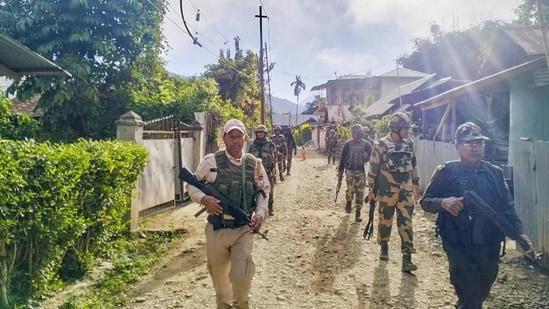The state security advisor has announced the deployment of 90 additional companies of Central Armed Police Forces (CAPF). This decision comes in the wake of ongoing ethnic clashes and unrest that have disrupted peace in the northeastern state for months. The additional forces are expected to strengthen existing security arrangements and support local law enforcement in curbing violence, ensuring public safety, and fostering an environment conducive to reconciliation.
A Prolonged Crisis
Manipur has been grappling with an extended period of turmoil marked by clashes between the Meitei and Kuki communities over ethnic and territorial issues. The unrest, which began in May 2023, has resulted in over 200 deaths, thousands of injuries, and the displacement of tens of thousands of people. The situation has severely impacted daily life, with schools, businesses, and essential services being disrupted. Despite multiple efforts by the state and central governments to mediate peace, sporadic incidents of violence continue to hinder progress.
Role of Central Forces in Peacekeeping
The decision to deploy additional CAPF companies highlights the importance of federal intervention in resolving state-level crises. CAPF units such as the Central Reserve Police Force (CRPF), Border Security Force (BSF), and Indo-Tibetan Border Police (ITBP) have been instrumental in maintaining law and order during emergencies across India.
In Manipur, the newly deployed forces will focus on:
- Ensuring Security in Sensitive Areas: Strategically deploying personnel in regions prone to clashes to prevent further violence.
- Protecting Displaced Communities: Safeguarding internally displaced persons (IDPs) living in relief camps from external threats.
- Facilitating Reconciliation Efforts: Assisting in confidence-building measures between conflicting communities to create avenues for dialogue and trust.
The state security advisor emphasized the need for a well-coordinated effort, stating, “These additional deployments are not merely to control violence but to foster a sense of security among the people and pave the way for long-term peacebuilding.”
Challenges on the Ground
While the presence of additional CAPF units is a welcome step, it comes with its set of challenges. One major hurdle is navigating the rugged terrain of Manipur, which often limits accessibility to conflict zones. Moreover, balancing neutrality in a highly polarized environment requires tact and careful strategizing to avoid perceptions of bias.
The forces must also work in tandem with local law enforcement and community leaders to ensure that interventions are effective and culturally sensitive. Coordination is key to avoiding clashes between security forces and local groups, which can further escalate tensions.
The Road Ahead
Experts suggest that restoring peace in Manipur requires a multi-faceted approach. While the immediate focus remains on controlling violence, long-term solutions must address the root causes of the conflict, including issues of land rights, ethnic identity, and economic development.
- Rehabilitation and Resettlement: The state must prioritize rebuilding homes and communities for those displaced by the violence.
- Dialogues and Negotiations: Establishing a platform for open dialogue between Meitei and Kuki leaders to resolve grievances is crucial.
- Policy Interventions: A fair and inclusive framework addressing ethnic and territorial concerns can help bridge divides.
Civil society organizations, NGOs, and other stakeholders also have a significant role to play in supporting reconciliation efforts and promoting communal harmony.
Central Government’s Role
The central government has shown its commitment to addressing the crisis by sanctioning additional forces and holding high-level discussions with state authorities. Union Home Minister Amit Shah had earlier visited Manipur to assess the situation and announced several measures, including compensation for victims and support for development projects in the region.
The central leadership’s involvement is expected to lend weight to the peacekeeping process and send a strong message against violence. However, sustained political will and close monitoring of the situation are essential to prevent the recurrence of such unrest in the future.
The deployment of 90 additional CAPF companies in Manipur marks a decisive step in addressing the state’s volatile situation. While the move underscores the government’s commitment to restoring peace, the path to long-lasting stability requires addressing the socio-political underpinnings of the conflict. A blend of immediate security measures and long-term reconciliation efforts can pave the way for a peaceful and harmonious Manipur.
As the people of the state continue to yearn for normalcy, the coordinated efforts of the central and state governments, security forces, and local stakeholders hold the key to turning this aspiration into reality.

